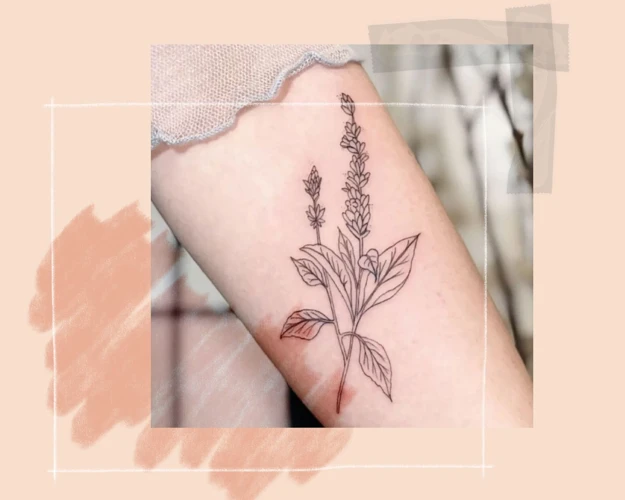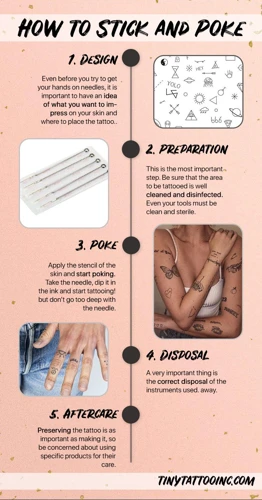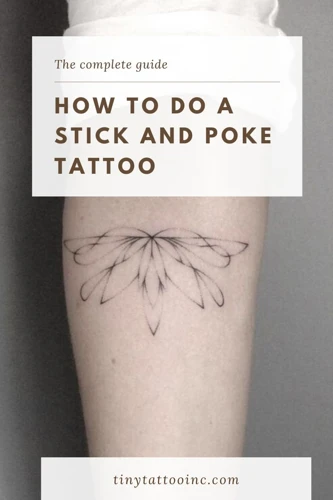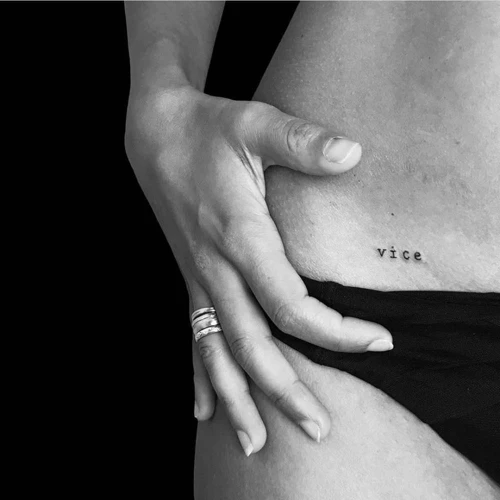Are you considering getting a tattoo but don’t want to go to a professional tattoo artist? Then you should learn how to hand poke tattoo. Hand poking is a traditional method of body art that involves creating a design on the skin with a needle and ink. By following this step-by-step guide to hand poke tattooing, you can create a safe and beautiful tattoo that you’ll be proud to show off!
Contents
What is Hand Poke Tattoo?

Hand poke tattoos, also known as stick and poke tattoos, are a form of tattooing that is done manually, without the use of a tattoo machine. They are created with a single needle, which is dipped in ink and poked into the skin. This method of tattooing is believed to have originated in the Polynesian Islands, and has been used by many cultures around the world for centuries.
Here are some interesting facts about hand poke tattoos:
- It’s a slower process: Hand poke tattoos take longer to complete than machine tattoos because the artist has to manually poke each dot of ink into the skin. This means that the tattoo process can take anywhere from an hour to several hours, depending on the size and design of the tattoo.
- It can look more unique: Since the artist has to manually poke the ink into the skin, it can create a unique texture and look compared to machine tattoos. This can make the tattoo look more organic and have a softer feel.
- It can be less painful: Because the needle is only poking the ink into the skin instead of pushing it, the level of pain can be less than with a machine tattoo. However, this can depend on each person’s pain tolerance.
- It requires more skill: Hand poke tattoos require more skill from the artist, since they are doing everything manually. This means that the artist must have a steady hand and a good eye for detail.
- What you need for a stick and poke tattoo: To get a hand poke tattoo, you will need a single needle, ink, gloves, rubbing alcohol, and a bandage.
Hand poke tattoos can be a great way to get a unique and meaningful tattoo. If you are interested in getting a hand poke tattoo, make sure to find a reputable artist who will use the proper tools and techniques to ensure a safe and beautiful tattoo.
What You Need to Hand Poke Tattoo

- Tattoo Needles: You will need single-use, pre-sterilized needles in a variety of sizes, depending on the design of the tattoo.
- Inks: You will need professional-grade inks that are safe to use on skin. Be sure to select inks that are vegan and cruelty-free.
- Tattoo Machine: You will need a professional-grade tattoo machine, such as a rotary or coil machine, to complete the tattoo.
- Gloves and Masks: You will need to wear gloves and a face mask to protect yourself and your client from infection. Additionally, you should have a pair of disposable gloves available for your client to wear during the tattoo procedure.
- Tattoo Stencil: You will need a stencil to transfer your design onto the skin. This can be created using a thermal transfer printer or hand-drawn on tracing paper.
- Tattoo Aftercare Products: You will need a selection of aftercare products designed specifically for tattoos, such as a healing balm, mild soap, and lotion.
Preparing to Hand Poke Tattoo

Preparing the Skin
Before you start hand poking the tattoo, the skin must be cleaned to avoid infection. Wash the area with a mild soap and warm water, then dry off with a clean cloth. Apply a thin layer of tattoo lubricant such as petroleum jelly to the area and let it sit for about 10 minutes. This will help the needles penetrate the skin more easily.
Preparing the Needles
Once the skin is prepared, it’s time to prepare the needles. Make sure the needles are clean and sterilized before use. This can be done by soaking them in rubbing alcohol or boiling them in water. Once the needles are sterilized, attach them to the tattoo machine and adjust the speed, power, and depth settings.
Preparing the Ink
The next step is to prepare the ink. Choose a high-quality, non-toxic pigment to ensure the tattoo looks its best and doesn’t cause any skin irritation. Mix the ink with a small amount of water until it has a slightly thicker consistency than paint.
Preparing the Equipment
The final step is to prepare the equipment. Place a piece of clean, sterile cloth beneath the tattoo area to catch any excess ink. Set up the tattoo machine with the appropriate needles and power settings. Make sure the machine is securely fastened to a stable surface before starting. Finally, make sure to have a few pairs of disposable gloves handy to make sure the area is kept clean throughout the process.
Executing the Hand Poke Tattoo

Marking the Design
Before you start the tattoo, it’s important to mark the design. This can be done by drawing the design on the skin with a marker or a pen. Once the design is marked, you should make sure that it is symmetrical and the lines are even.
Applying the Ink
After the design is marked, you can begin to apply the ink. Make sure to use sterile needles, gloves, and a clean work surface. Dip the needle into the ink and poke it gently into the skin, making sure to follow the outline of the design.
Following the Design
Once the ink is applied, you should follow the design. You may need to go over the lines multiple times to make sure the ink is applied evenly. Try to keep the needle at the same depth and angle throughout the process.
Finishing the Tattoo
Once the tattoo is complete, you should clean the area with an approved antiseptic and cover it with a bandage. Make sure to keep the area clean and dry to prevent infection. After a few days, you can remove the bandage and enjoy your beautiful new tattoo.
After Care for Hand Poke Tattoo

Immediately After:
| Step | Instructions |
| 1 | Remove bandage after two hours. |
| 2 | Wash the tattoo with lukewarm water and mild soap. |
| 3 | Pat dry with a clean towel. |
| 4 | Apply a thin layer of ointment or moisturizer. |
| 5 | Cover the tattoo with a bandage if needed. |
During Healing:
| Step | Instructions |
| 1 | Keep the tattoo clean and dry. |
| 2 | Wash the tattoo gently with lukewarm water and mild soap. |
| 3 | Apply a thin layer of ointment or moisturizer. |
| 4 | Repeat the cleaning and moisturizing process 3 times a day. |
| 5 | Avoid sun exposure and swimming. |
| 6 | Do not pick or scratch the tattoo. |
Advantages and Disadvantages of Hand Poke Tattoo
Advantages
| Advantage | Description |
|---|---|
| Less Painful | Hand poking is less painful than traditional tattoo machines as the needles penetrate the skin more slowly. |
| More Control | The artist has greater control over the depth and density of the ink, allowing for more intricate designs. |
| Less Expensive | Hand poking is far less expensive than using a machine, as there are no additional costs associated with using a machine. |
| Shorter Sessions | The sessions are usually shorter than when using a machine as the artist has more control over the process. |
Disadvantages
| Disadvantage | Description |
|---|---|
| Time-consuming | The process of hand poking is extremely time-consuming, as it requires the artist to carefully pierce the skin. |
| Limited Design Options | The design options are limited when hand poking, as the artist has to work with their hand and cannot use a machine. |
| Infection Risk | The risk of infection is higher when hand poking, as the artist does not have the same control as with a machine. |
| Higher Risk of Scarring | The risk of scarring is higher when hand poking as the needles penetrate the skin more deeply and slowly than a machine. |
Frequently Asked Questions
What Tools are Needed for Hand Poking a Tattoo?
Tattoo Needles: Hand poking requires needles that are specifically designed for tattooing. These needles come in different sizes and configurations, depending on the desired look of the tattoo.
Ink: Ink is typically applied with a needle or brush, depending on the size and complexity of the tattoo.
Gauze: Gauze is used to apply pressure and keep the skin clean during the tattooing process.
Soap and Water: Soap and water are used to clean the skin before and after the tattooing process.
Gloves: Gloves are worn to protect both the tattoo artist and the client from contamination and cross-contamination.
How long does it take to hand poke a tattoo?
Hand poking a tattoo typically takes longer than using a machine, so it can take anywhere from a few hours to an entire day depending on the size and complexity of the design. The process also requires more precision and patience, so it is important to set aside enough time to complete it.
Are there any health risks associated with hand poking a tattoo?
Yes, there are potential health risks associated with hand poking a tattoo. These include:
- Infection – Hand poking increases the risk of infection, as proper sterilization processes may not be followed. It is important to ensure needles and other equipment are sterilized or disposable.
- Allergic reaction – It is important to be aware of the ingredients in the inks and dyes used, as these may cause an allergic reaction.
- Scarring – Hand poking can cause scarring, as the needle penetrates the skin more deeply than with a machine.
- Blood-borne diseases – Hand poking increases the risk of transmitting or contracting blood-borne diseases such as hepatitis B, hepatitis C and HIV.
It is important to be aware of the potential risks and take the necessary precautions when hand poking a tattoo. Ensure that proper sterilization processes are followed and that the inks and dyes used are safe.
Is Hand Poking More Painful Than Machine Tattooing?
- Yes: Hand poke tattoos are typically more painful than machine tattoos because they penetrate the skin more deeply and are done at a slower speed. Hand poking also causes more trauma to the skin, as it involves pushing the needle deeper into the skin, whereas a machine tattoo moves the needle quickly and with less force.
- No: Hand poking is not necessarily more painful than machine tattooing, as the amount of pain experienced depends on the individual and their pain tolerance. Some people find hand poking to be less painful than machine tattooing, while others find it to be more painful.
- Conclusion: Ultimately, the pain associated with hand poking and machine tattooing is subjective and can vary from person to person. The best way to determine which type of tattooing is more comfortable for you is to try both and see which one works best for you.
What is the Best Way to Care for a Hand Poked Tattoo?
Keep the tattoo clean: Wipe the tattooed area regularly with an antibacterial soap and lukewarm water. Pat the area dry with a clean towel.
Apply ointment: Apply a thin layer of ointment on the tattooed area to keep it moist.
Avoid sunlight: Keep the tattooed area covered with a bandage and avoid direct exposure to sunlight.
Moisturize: Apply moisturizer on the tattooed area 2-3 times a day.
Do not scratch: Avoid scratching or picking on the tattooed area as it may damage the skin and cause infection.
Conclusion
Hand poking tattoos are a safe, affordable, and creative way to express yourself. With the right preparation and knowledge, anyone can create beautiful tattoos with confidence. Hand poking tattoos are a great way to personalize your body art without the need for a professional tattoo artist.